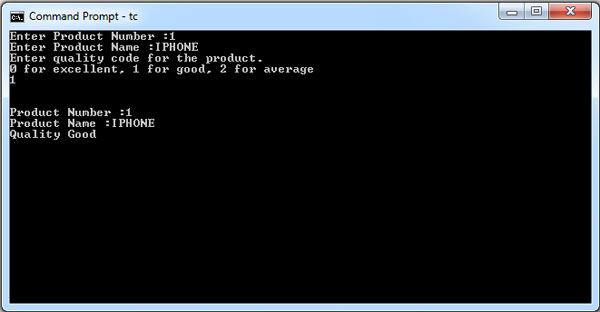An enumerated data type is also an user defined data type. The enum keyword is given before the enumerated data type. A list can tell the compiler which values a given variable can take. Consider the following example:
enum temp{Veryhot, Hot, Medium, Cold};
temp is of enum type and has four members Veryhot, Hot, Medium and Cold. The value 0 is assigned to Veryhot, value 1 is assigned to Hot, 2 is assigned to Medium and so on. The enum specifier allows the user to specify the possible value of the type. If an initial value of -1 is assigned to the first element of the enum type, the subsequent elements are assigned the values 0, 1, 2, etc.
A variable of enum type can be declared as follows:
temp t1;
This indicates that t1 is a variable of type temp which is of enum type.
Example
Write C++ program illustrates the use of enumerated data type.
#include <iostream.h>
#include<conio.h>
enum qlty{excellent, good, average};
struct product
{
char prodno[10];
char prodname[20];
qlty q1;
} prod;
void main()
{
clrscr();
cout<<"Enter Product Number :";
cin>>prod.prodno;
cout<<"Enter Product Name :";
cin>>prod.prodname;
cout<<"Enter quality code for the product.";
cout<<"\n0 for excellent, 1 for good, 2 for average \n";
cin>>int(prod.q1);
cout<<"\n\nProduct Number :"<<prod.prodno;
cout<<"\nProduct Name :"<<prod.prodname;
if(prod.q1==0)
cout<<"\nQuality Excellent";
else if(prod.q1==1)
cout<<"\nQuality Good ";
else
cout<<"\nQuality Average ";
getch();
}

 Dinesh Thakur holds an B.C.A, MCDBA, MCSD certifications. Dinesh authors the hugely popular
Dinesh Thakur holds an B.C.A, MCDBA, MCSD certifications. Dinesh authors the hugely popular